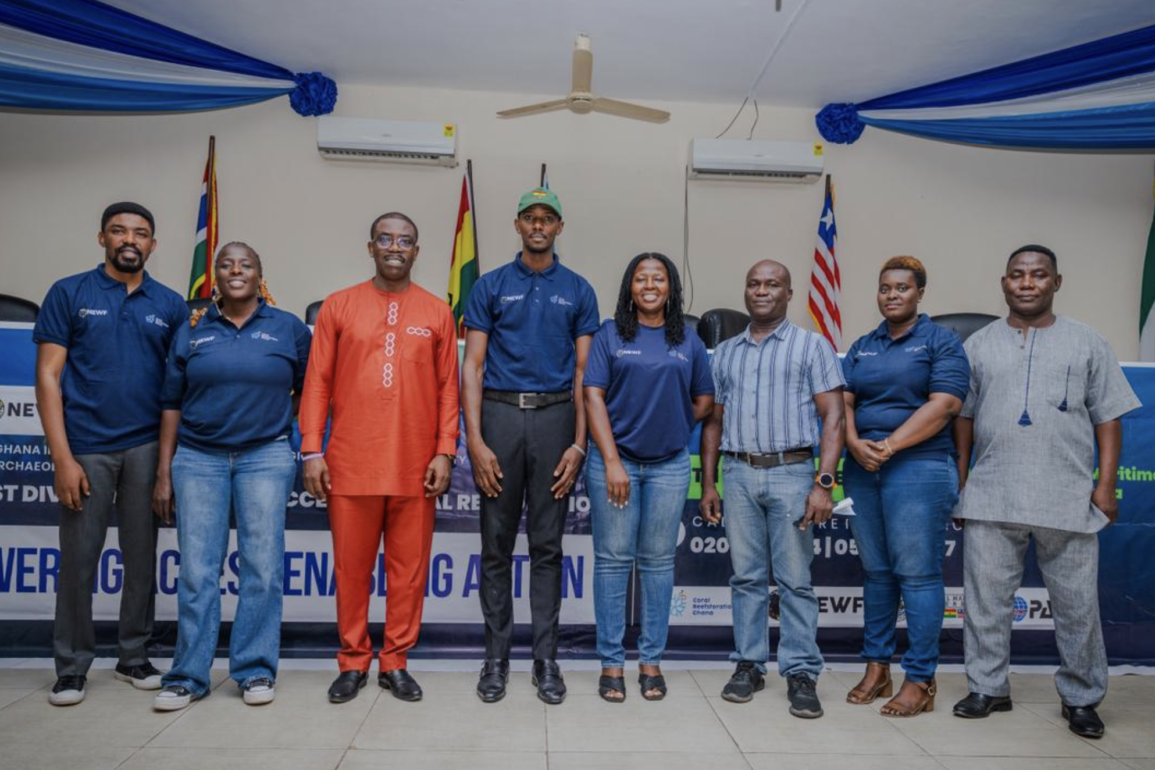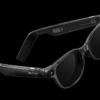Along Ghana’s sunlit coast, where fishing boats line the horizon and the tides carry both sustenance and stories, George Amado is leading a quiet revolution beneath the surface. A PADI-certified dive instructor and Nature, Environment and Wildlife Filmmakers (NEWF) Fellow, Amado has launched Ghana’s first locally-led dive lab — a hands-on initiative designed to bridge the gap between marine science and community-driven conservation.
The week-long program, held from September 15 to 21, brought together young Ghanaians for immersive dive training, environmental education, and collaborative research. But for Amado, it’s about far more than learning to swim with tanks and fins — it’s about empowering the next generation to take ownership of their country’s waters.
“I grew up along Ghana’s coast, where the ocean was both a source of livelihood and wonder,” he says. “But over the years, I watched pollution, overfishing, and other human activities degrade our waters. That sparked my curiosity and passion for marine conservation. Eventually, I trained as a diver and marine conservationist, determined to use my skills to protect our underwater ecosystems.”
His journey to this moment has been one of steady growth. Before founding the dive lab, Amado worked as a swim instructor, led coastal clean-ups, and joined coral reef restoration projects. He presented his work at the West African Marine Science Symposium, where a chance meeting with marine scientist and National Geographic Explorer Edem Mahu changed everything.
Mahu introduced Amado to NEWF and encouraged him to take her spot in a dive lab. That decision opened the door to his certification as a dive instructor — and eventually, to his dream of hosting Ghana’s first dive lab. “Each of these experiences — from local community efforts to international collaborations — built on one another and prepared me to launch something as ambitious as this maiden dive lab,” he says.
Amado’s motivation is rooted in a striking gap: few Ghanaian scientists and conservationists have the diving skills needed to study marine ecosystems firsthand. “Ghana has a long coastline and rich marine biodiversity, but there’s a huge gap when it comes to diving capacity,” he explains. “The dive lab was born out of a vision to bridge that gap — to equip local scientists, youth leaders, and conservationists with both the technical diving skills and the research tools to safeguard our waters.”
Participants were selected through a nationwide call-out, representing marine biologists, youth leaders, conservation practitioners, and early-career scientists. While some had never been in the water before, others arrived with theoretical knowledge but little practical experience.
“This diversity creates a unique learning environment where everyone grows together and shares perspectives,” says Amado. “Watching their excitement the first time they breathe underwater — from the pool sessions to the ocean dives — has been incredibly rewarding.”
The dive lab comes at a critical time for Ghana, where environmental threats such as illegal mining in rivers have polluted waterways and damaged fragile coastal ecosystems. “Illegal mining and pollution affect both rivers and coastal ecosystems,” Amado notes. “By training more local scientists and conservationists, we’re building a network of people who can collect data, raise awareness, and advocate for stronger policies. The dive lab gives them the tools to connect the dots between inland activities and ocean health.”
Launching the initiative was not without obstacles. “Diving equipment, training, and logistics are expensive,” Amado says. “We had to be creative — reaching out to partners like NEWF and the Regional Maritime University, pooling resources, and finding sponsors who believed in the vision.”
Trust and transparency, he adds, were just as important as funding. “We overcame it through strong community partnerships,” he explains. “Ultimately, conservation can only succeed if communities see the benefits and become partners in the mission.”
Community engagement lies at the heart of the dive lab. Beyond training scientists, Amado and his team involve fishers, youth, and schools in outreach activities, teaching them about the importance of protecting marine habitats and the long-term economic benefits of sustainability.
Noel Kok, Executive Director of NEWF and a National Geographic Explorer, believes Amado’s work reflects a larger shift in conservation leadership. “George’s journey from trainee to instructor is inspiring, and the fact that he is now hosting his own dive lab is a testament to what’s possible when communities take the lead in conservation,” he says.
Pragna Parsotam-Kok, Executive Director of NEWF and also a National Geographic Explorer, adds: “Supporting these stories is essential, not just for Ghana, but for the entire continent. This lab is about more than diving; it’s about building a movement — a growing collaboration among skilled filmmakers, divers, and conservationists, all dedicated to ensuring African voices tell African stories.”
Amado hopes the dive lab will serve as a catalyst for similar initiatives across West Africa, inspiring a generation of scientists who see the ocean not as a distant realm, but as part of their identity and responsibility.
One moment stands out vividly in his memory — watching professors and lecturers of marine science dive for the very first time. “Seeing their amazement as theory came to life was powerful,” he recalls. “It reminded me that sometimes, all it takes to change how we see our environment is the courage to look beneath the surface.”




